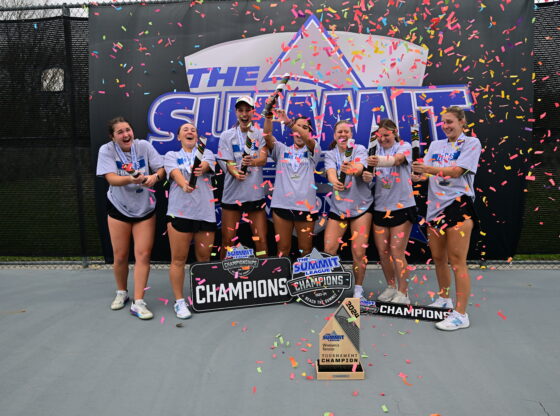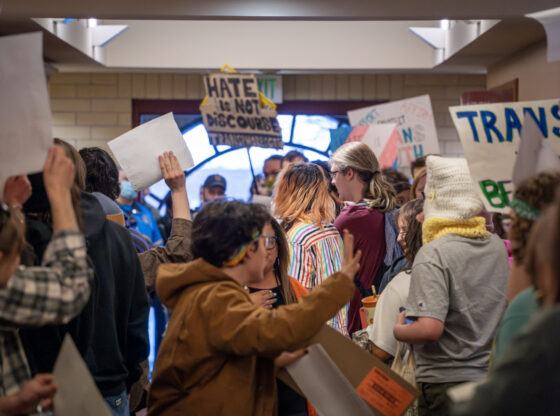This week, as part of our “On The Margins at DU” column that investigates the successes and failures of inclusive excellence at DU, The Clarion spoke with members of Multicultural Greek Council (MGC). MGC oversees six different sororities and fraternities: Pi Lambda Chi, Sigma Lambda Beta, Sigma Lambda Gamma, Kappa Phi Lambda, Theta Nu Xi and Beta Gamma Nu. It seeks to “promote the awareness of multicultural diversity within collegiate institutions, their surrounding communities, and the greater community-at-large.”
In this interview, the following students are included:
- Ananda Dimock, a third-year from Kappa Phi Lambda and VP of MGC Administration
- Victoria Martinez, a third-year in Sigma Lambda Gamma and President of MGC
- Getssemany Rivera, a senior in Sigma Lambda Gamma
- Itchel Cardenas, a senior in Pi Lambda Chi
- Darli Ramirez, a second-year in Pi Lambda Chi and VP of MGC Development
- Jessie Jennett, a senior in Theta Nu Xi
- Jorge Porras, a senior in Sigma Lamda Beta
- Oscar Saenz, a senior in Beta Gamma Nu
To get involved and support MGC, follow them and their individual organizations on social media. Their Instagram is @dumgc, and their Facebook is @MGCatDU.
This interview has been edited for clarity and cohesion.
Kiana: For those who don’t know, could you explain what role MGC serves on campus? What has been your experience?
Itchel: DU is a predominately white institution, so the MGC communities provide a home away from home. They are a safe space for people from diverse backgrounds to come together and establish a sense of belonging with one another. MGC represents our values and who we are as individuals.
Victoria: When I first came to DU, I was trying to find a sense of community on campus. But most spaces were predominantly white, and it isolated me. It reinforced to me that I was different. DU was not a place where I felt accepted until I started meeting people in MGC. They were the ones who made it all worth it for me.
Kiana: How inclusive of an environment do you think DU is for marginalized communities?
Itchel: When it comes to DU as a whole, there is definitely room for improvement on incorporating minorities and diverse cultures. DU is a very segregated institution.
Jessie: Integration is a huge problem. It is largely the same pocket of 20 white students who show up to any events moderately cultural. I started at DU when a national administration got elected that solidified those racial barriers, and this school epitomized that divide.
Our mascot and name, ‘Pioneer,’ has continuously shown students of color and indigenous students that the school does not care. Removing that name has been a campaign for the last 15 years. Administration after administration has shown that this problem is embedded in our school’s culture.
Kiana: In what ways has DU succeeded in taking the community into consideration?
Ananda: We have an MGC advisor now. The associate director of FSL is in Beta Gamma Nu, which is great, since people who are in Interfraternity Council or Panhellenic Association generally don’t understand MGC and how it functions.
Jorge: What I have seen is not a group effort at DU—it is more of an individual effort. I have staff or faculty who I can go to for help that DU hired. They are willing to go to the ends of the world in order to help us because they understand what we are going through.
Kiana: In what ways has DU failed or continue to fail to take marginalized groups into consideration?
Jessie: I used to work on the DU Programming Board, and DUPB was just not collaborative or open to the idea of working with affinity organizations. It felt like their attitude was, ‘Those events only apply to a small amount of students.’ It was not a part of the conversation. There was no representation of anything other than one framework.
Being overlooked by both administration and student groups like USG is a problem. It is tough to be the quiet and ignored part of campus. It continues to suffocate the community.
Itchel: DU underpays staff members like our advisors. It is hard for them to do their own work, while also being expected to be there for our organizations when they may not have enough experience or training to support us properly.
Victoria: A lot of us are from lower socioeconomic backgrounds. Every single year that I have been here, they have raised the tuition. I understand they are doing construction and have this 10-year plan, but we are not reaping any benefit from it. We are paying for students 10 years down the road. That money is not enhancing our academics, learning, buildings or infrastructure.
Kiana: What barriers or obstacles has MGC specifically run into?
Jorge: It is hard to get what’s necessary for our organizations. We are pushed to the side, and DU does not make it easy or equitable. A big event we had was the Taste of Latin America. We had money from different departments for it, but we could not get it transferred into our student accounts because of barriers there. DU was not lenient with us. They would not tell us how to do it.
Oscar: MGC was stuck in a cycle of restarting every year or two because there was a lot of turnover in terms of students and staff support. All we want is stability and consistency. We don’t have a presentation of what is going on within our communities. The university doesn’t provide us those supportive tools.
Kiana: Could you expand on that? In what ways have they failed to support MGC?
Itchel: It is crazy to think that our community of 60 people or so is responsible for bringing cultural awareness to our university. DU should be doing that. Why is it that small groups of students are putting these events on and not getting any help coordinating? Why are there so many barriers we have to overcome just for the university to expose itself to diversity?
Getssemany: We host a lot of events on campus promoting cultural awareness. When we put these events on, we are asked to pay for rooms and everything the event encompasses. We do not get any support, yet DU goes and says they hosted it. They don’t show up to these events, but they are marketing off them. They make it seem like these events are coming from the University rather than the individual groups putting in the work to make us more inclusive.
Kiana: You brought up how DU markets itself. What is your impression of how DU advertises ‘inclusive excellence’?
Jessie: Their inclusivity is tokenizing, the way they utilize students of color in promotional materials. I grew up in a diverse spectrum, especially with racial diversity. When I came to DU, I expected it to be similar. But when you show up, you realize those flyers are carefully put together. This university has a lot of work to do, considering the demographics that attend this school.
Darli: The term inclusive excellence is a marketing strategy at this point. I am a cheerleader at DU, and I see cheerleaders of color being marketed. They take more pictures of us. When I applied to DU, I thought the campus would be diverse because everyone kept repeating ‘inclusive excellence.’ But I came on campus and asked—‘Why is everyone white?’
Kiana: What do you hope to see in the future of inclusive excellence?
Getssemany: Funding for our organizations and affinity groups.
Jessie: A full-time, well-paid staff member who can advocate for our groups.
Victoria: DU should be marketing our events. We do our best to invite the people we know, but we can only do that to a certain extent. It can be disappointing when we do so much work and no one shows up other than the same 20 or 30 people.
Itchel: We don’t have a seat at the table, someone who can go and be there for us. Someone who has training if they are not part of the community, so they know who we are, what we do and how to lead our community at a PWI.
We need transparency. We have to know if there are going to be changes in room charges or funding. The amount of work every single person in this room puts into putting on events—it is too much. The University should be doing these things, and they should be trying to bring them on a bigger scale.
Rooms for student organizations should be free. If you look at the budget for any of the events we have done on a grander scale, more than 50 percent of our budget goes to paying for the room and AV. We should be able to spend money on the programming and actual experience everyone is having—not on a space.
Kiana: Why is it important to talk about this issue from a multicultural perspective?
Jessie: They hire one person of color, and they expect that person to represent all of us. They say, ‘We gave someone a space at the table, why didn’t you take advantage of it?’ If they’re going to boast inclusive excellence, it should include the people they are putting on their posters. But there’s no outreach. This interview is the first time someone has reached out to us to talk on this issue.
Jorge: We are the ones we experience this, so why aren’t they asking us what is going on? We have the best advice. If the University wants growth, they need to open their mind to other cultures. We go here to get educated, but we can educate others too.
Through this column, we hope to shed light on the range of identities and experiences that exist on campus, create a space where their voices can be heard and highlight their contentious relationship with DU. We hope to represent them with as much journalistic integrity as possible, but we are aware that there are stories we will fail to communicate with the same voice. We aspire to do better than student organizations and institutions, including The Clarion, have done in the past at treating these topics with the thought and consideration they deserve.
If there is feedback you would like to give or issues you would like to see covered in this column, please reach out to duclarioneditorialteam@gmail.com.
An earlier version of this article incorrectly spelled the name Itchel as Itzhel.











